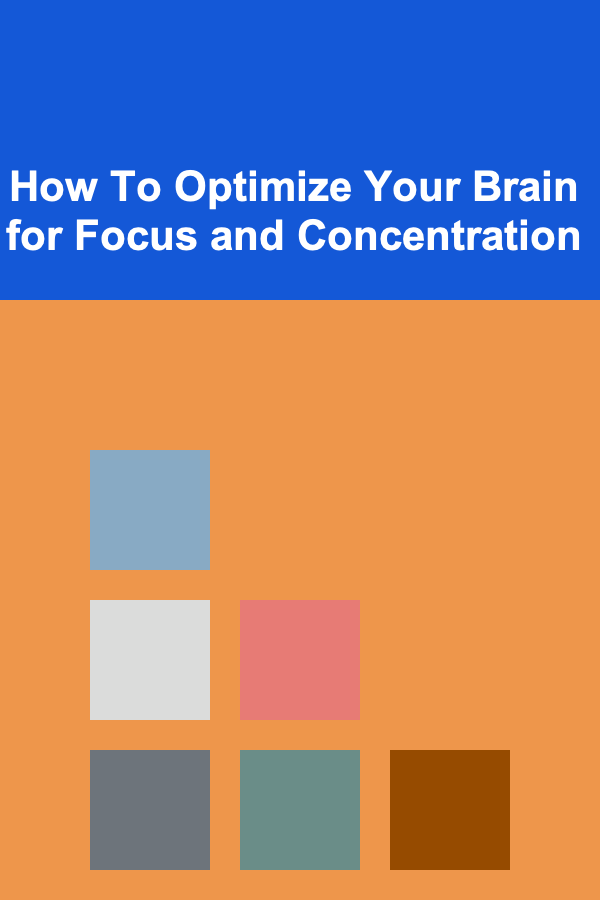
How To Optimize Your Brain for Focus and Concentration
ebook include PDF & Audio bundle (Micro Guide)
$12.99$8.99
Limited Time Offer! Order within the next:

In a world full of distractions, maintaining focus and concentration has become increasingly difficult. With the constant influx of information, notifications, and tasks pulling at our attention, optimizing our brain to stay focused is essential for personal and professional success. Whether you're trying to finish a project at work, study for an exam, or simply improve your daily productivity, enhancing your cognitive abilities to focus and concentrate is a skill that can transform your life.
In this article, we will explore strategies, scientific insights, and practical tips to help optimize your brain for improved focus and concentration. We'll dive into how the brain works, why focus is so crucial, and how you can use this knowledge to improve your ability to concentrate in any situation.
Understanding Focus and Concentration
Before delving into the methods for improving focus and concentration, it's important to first understand what these terms really mean. While the words "focus" and "concentration" are often used interchangeably, they refer to slightly different processes in the brain.
Focus
Focus refers to the ability to direct your attention to a particular task, idea, or goal. It involves the intentional effort to ignore distractions and hone in on what is important at the moment. Focus requires mental energy, and the more focused you are, the less mental energy is wasted on irrelevant stimuli.
Concentration
Concentration, on the other hand, is the ability to maintain focus over a longer period. It is the sustained mental effort to keep your attention on a task, even as challenges and distractions arise. Without concentration, focus would be short-lived and fleeting, preventing you from making significant progress toward your objectives.
Both focus and concentration are critical for productivity, learning, and decision-making. So, how can we optimize our brain to enhance these abilities?
Brain Anatomy and Focus
To better understand how to improve focus, it helps to know how our brain works when it comes to attention. Focus and concentration are largely controlled by the prefrontal cortex --- the area at the front of the brain that is involved in higher-level cognitive functions such as decision-making, problem-solving, and regulating emotions. This region of the brain plays a significant role in controlling attention and inhibiting distractions.
Another important area of the brain involved in focus is the parietal lobe , which helps to process sensory information and integrate it with what we need to focus on. The dopaminergic system also plays a key role, as dopamine is a neurotransmitter that is involved in motivation and reward processing. When your brain gets a "reward" for completing a task, dopamine is released, which can further enhance your focus.
Understanding these regions and systems helps us to tailor strategies that improve the brain's efficiency in focusing and concentrating.
The Science Behind Focus and Distractions
Our brains are naturally wired to respond to distractions. The brain operates on a system of attentional networks that prioritize certain stimuli over others. When you encounter something novel or threatening, the brain tends to shift focus toward that stimulus, a process known as "attentional capture."
However, in the modern world, the constant barrage of notifications, emails, and social media updates hijacks our attention continuously, making it difficult to maintain focus on any single task for an extended period. The process of switching attention between tasks is known as task-switching or cognitive shifting, and while it can be useful in some scenarios, it can also reduce productivity and increase mental fatigue.
In fact, research shows that multitasking actually leads to decreased performance. The brain can't truly multitask; rather, it switches between tasks rapidly, and this constant switching results in lower efficiency. The more often the brain shifts focus, the harder it becomes to maintain attention on any one task, and it requires more mental energy to get back on track.
Sleep: The Foundation for Optimal Focus
One of the most important factors that influence focus and concentration is sleep. When we don't get enough rest, the prefrontal cortex and other areas responsible for attention and decision-making don't function optimally. Poor sleep can impair working memory, decrease attention span, and even increase the likelihood of distractions.
How Sleep Affects Brain Function:
- Memory consolidation: Sleep is essential for consolidating information learned during the day. Without proper rest, your brain struggles to store and recall important details.
- Cognitive performance: Lack of sleep leads to sluggish cognitive performance, impairing your ability to focus, reason, and process information quickly.
- Emotional regulation: Sleep helps regulate emotions, and when deprived of it, you are more likely to experience frustration or stress, further hindering concentration.
The key takeaway is that sleep isn't just about feeling rested; it's about giving your brain the opportunity to reset and optimize its cognitive processes. For maximum focus, aim for 7-9 hours of sleep per night, and try to maintain a consistent sleep schedule.
Nutrition and Brain Health
Your diet plays a crucial role in your brain's ability to focus and concentrate. Just like any other organ, your brain requires the right fuel to function properly. Poor nutrition, especially diets high in sugar and unhealthy fats, can impair cognitive function and reduce your ability to stay focused.
Key Nutrients for Focus:
- Omega-3 fatty acids: Found in fish, walnuts, and flaxseeds, omega-3 fatty acids are essential for brain health and have been linked to improved cognitive function, memory, and focus.
- Antioxidants: Foods rich in antioxidants, such as berries, dark chocolate, and leafy greens, help protect the brain from oxidative stress and promote healthy brain function.
- Complex carbohydrates: Foods like whole grains, legumes, and vegetables provide a slow and steady release of glucose, the brain's primary energy source, keeping you alert and focused throughout the day.
- Protein: Proteins from lean meats, eggs, and plant-based sources contain amino acids that are vital for neurotransmitter production, enhancing memory, focus, and concentration.
Avoiding Brain Disruptors:
- Excessive sugar: High sugar intake can lead to blood sugar spikes and crashes, which can make it difficult to maintain focus.
- Caffeine dependence: While caffeine can provide a temporary boost in alertness, excessive consumption can lead to jitteriness, anxiety, and a crash in energy levels.
Eating a balanced diet that supports brain health is a long-term strategy to optimize focus and concentration.
Exercise: Boosting Brain Power
Physical exercise is another key factor in enhancing focus. Exercise has been shown to improve brain function by increasing blood flow and oxygen to the brain, which supports cognitive performance and concentration. Additionally, regular physical activity helps to increase the production of brain-derived neurotrophic factor (BDNF), a protein that encourages the growth of new neurons and enhances synaptic plasticity --- the brain's ability to reorganize and adapt.
How Exercise Improves Focus:
- Stress reduction: Exercise is a powerful stress reliever, and since stress can negatively impact focus, reducing stress through physical activity helps improve mental clarity.
- Increased dopamine and serotonin: Exercise stimulates the release of dopamine and serotonin, neurotransmitters that play a crucial role in motivation, mood regulation, and focus.
- Improved sleep quality: Regular exercise helps promote deeper and more restorative sleep, which, as previously mentioned, is essential for optimal brain function.
To reap the benefits of exercise for brain health, aim for at least 30 minutes of moderate exercise per day, such as walking, swimming, or cycling.
Mindfulness and Meditation for Focus
Mindfulness and meditation practices are increasingly being recognized for their ability to enhance focus and concentration. These techniques train the brain to stay present and aware, preventing distractions from pulling attention away from the task at hand. Meditation, in particular, has been shown to physically change the brain by increasing the thickness of the prefrontal cortex, which is involved in attention and decision-making.
Benefits of Mindfulness and Meditation:
- Improved attention control: Regular mindfulness practice helps you maintain attention on one thing at a time, reducing the tendency to become distracted by irrelevant thoughts.
- Increased mental clarity: Meditation clears the mind of clutter, allowing for better decision-making and problem-solving.
- Stress reduction: Mindfulness and meditation activate the parasympathetic nervous system, promoting relaxation and reducing the effects of stress, which can impair focus.
To practice mindfulness, start with a simple breathing exercise: focus on your breath for a few minutes, paying attention to each inhale and exhale. Over time, you can increase the duration and incorporate guided meditation sessions.
Time Management and Task Structuring
Another critical element in optimizing focus is managing your time effectively. The way you structure your day and tasks can have a profound impact on your ability to concentrate.
Time Management Strategies:
- The Pomodoro Technique: Work in short, focused bursts of 25 minutes, followed by a 5-minute break. After four cycles, take a longer break. This method keeps your brain engaged while preventing burnout.
- Task prioritization: Use a prioritization system, such as the Eisenhower Matrix, to categorize tasks based on urgency and importance. Focusing on high-priority tasks first can help eliminate distractions.
- Break large tasks into smaller chunks: Large, daunting projects can overwhelm your brain, making it harder to concentrate. Break them into smaller, more manageable tasks, and focus on completing one task at a time.
By adopting time management techniques that minimize distractions and maximize focus, you can improve both productivity and concentration.
The Power of Rest and Downtime
In the pursuit of focus and productivity, it's essential to remember that rest is just as important as hard work. Constantly pushing yourself without adequate breaks can lead to cognitive fatigue and burnout, which ultimately undermines your ability to concentrate.
Importance of Downtime:
- Mental recharge: Taking breaks and allowing your brain to rest helps prevent burnout and enhances your ability to focus when you return to work.
- Creative problem-solving: Downtime, such as going for a walk or relaxing, allows the brain to make new connections and foster creativity, which is critical for problem-solving and focus.
Incorporate regular breaks throughout your day, and make time for hobbies, social activities, and relaxation to ensure your brain remains refreshed and capable of maintaining focus.
Conclusion
Optimizing your brain for focus and concentration involves a combination of lifestyle changes, cognitive strategies, and physical health practices. By understanding how the brain works, prioritizing sleep, nutrition, and exercise, and practicing mindfulness and time management, you can dramatically improve your ability to concentrate and maintain focus.
In today's fast-paced world, where distractions are constant and demands are high, enhancing focus is more critical than ever. By integrating these strategies into your daily life, you can not only improve your productivity and performance but also cultivate a healthier, more balanced mindset.
Focus is a skill, and like any skill, it requires practice and dedication. With patience and persistence, you can optimize your brain for improved focus and concentration, setting yourself up for success in all areas of your life.
Reading More From Our Other Websites
- [Home Pet Care 101] The Best Way to Handle a Scared Pet
- [Digital Decluttering Tip 101] Minimalist Apps and Tools: Essential Picks for Digital Newcomers
- [Organization Tip 101] How to Maintain Your Pressure Washer for Long-Lasting Use
- [Horseback Riding Tip 101] Best Strategies for Managing Horse Anxiety During Air Travel
- [Tie-Dyeing Tip 101] Safe & Stunning: Tips for Long-Lasting Tie-Dye Using Food-Grade Colors
- [Organization Tip 101] How to Tackle Seasonal Bathroom Organization Projects
- [Screen Printing Tip 101] How to Master the Art of Bleach‑Resist Screen Printing on Dark Denim
- [Home Soundproofing 101] How to Soundproof a Basement Ceiling to Reduce Noise Upstairs
- [Home Soundproofing 101] How to Create a Quiet Home Environment for Meditation
- [Organization Tip 101] How to Use Vertical Storage Solutions in Your Apartment

How to Clean Your Refrigerator and Freezer Effectively
Read More
How to Plan an Outdoor Garden Party for Any Occasion
Read More
Unlocking Talent: Strategies and Insights for Effective Talent Managers
Read More
The Connected Child: Building Bonds That Last a Lifetime
Read More
Choosing the Right Dust Mop for Hardwood Floors: A Comprehensive Guide
Read More
How to Knit with Unusual Materials: Paper, Fabric, and More
Read MoreOther Products

How to Clean Your Refrigerator and Freezer Effectively
Read More
How to Plan an Outdoor Garden Party for Any Occasion
Read More
Unlocking Talent: Strategies and Insights for Effective Talent Managers
Read More
The Connected Child: Building Bonds That Last a Lifetime
Read More
Choosing the Right Dust Mop for Hardwood Floors: A Comprehensive Guide
Read More